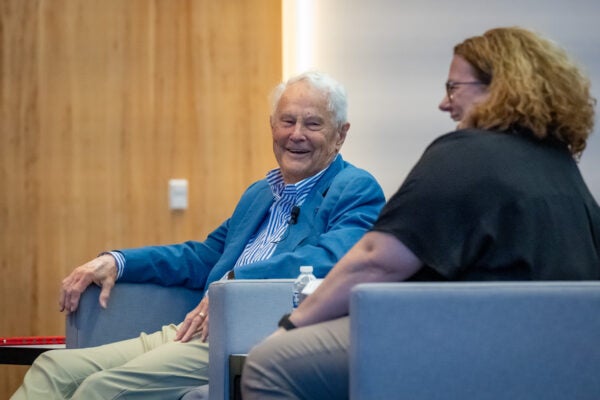Path to Philanthropy
Phil Canfield, BBA ’89, and his wife, Mary Beth, invest in the future of Business Honors with a $20 million gift to BHP
By Catenya McHenry
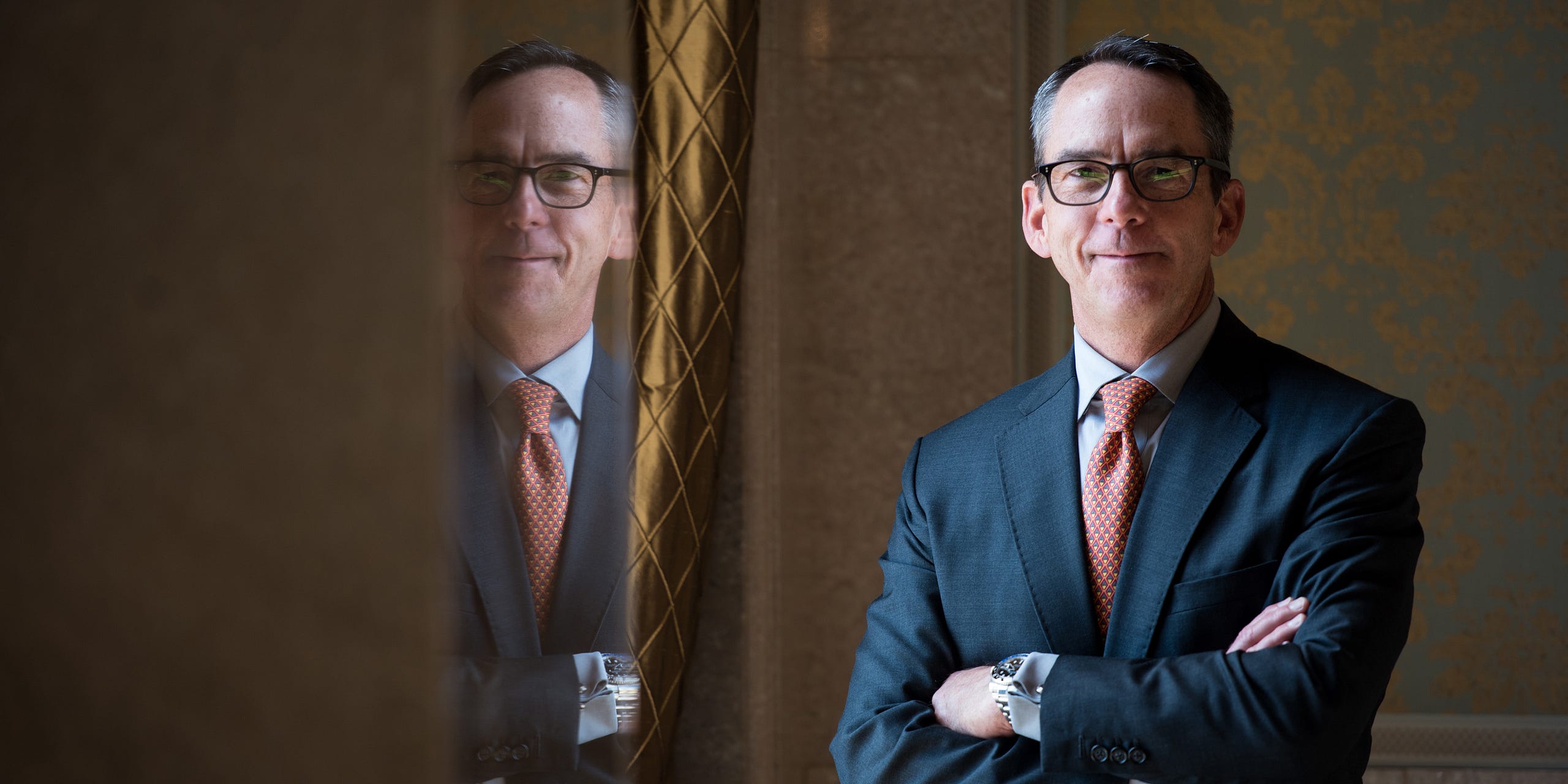
Phil Canfield, BBA ’89, whose undergraduate UT business honors education opened the door to a successful 30-year career as a private equity investor, recently described two life experiences that hold great significance for him. The occasion for sharing these memories was an exceptionally momentous event: He and his wife, Mary Beth, were guests of honor in November at a ceremony with an audience of hundreds. It was a celebration of their $20 million gift to Texas McCombs.
Canfield recalled a moment in 1984 when he was a junior at Houston’s Memorial High School. It was the “college conversation” with his father.
“My dad says, ‘Well, you want to study business, right?’ I say, ‘Yes.’ He says, ‘Well, Texas is one of the best business schools in the country, and you’re in state, so it’s pretty affordable. I really don’t see why you’d go anywhere else.’”
Hear Phil Canfield’s story in his own words on McCombs Made, our monthly podcast featuring trailblazing McCombs alumni and friends.
Fast-forward to 2016: Phil and Mary Beth Canfield are now parents themselves. They visit the 40 Acres with their oldest son, Clay, who has been admitted to the McCombs Business Honors Program, and Phil sees how much the program has evolved since he was a BHP student himself.
“As great as I thought BHP was back then when I was a student, it was 100 percent greater now.” Canfield says. “The cohort of admitted students were sharp, but they also had the UT way about them. They were friendly but also competitive, and I just love that.”
During that college visit, Canfield met with McCombs Dean Jay Hartzell. “Jay said something that was really, really pivotal to me,” Canfield says. “He said that the McCombs BHP program was the best undergraduate business program in the country.”
The dean’s assessment was based on a variety of factors: student quality, curricular rigor, collaborative approach, access to Austin’s thriving business ecosystem, and nationwide career placement and success. BHP students are in the top 1.75 percent of their high school class, and their average SAT score is 1479.
“I was blown away,” says Canfield. “But I told Jay, ‘There are probably just a lot of people — high school students and employers across the nation — who might not know us — or might not appreciate how good BHP is.’”
As Canfield shared these memories on a crisp November afternoon, he and Mary Beth stood side by side. The hundreds of alumni, faculty, staff, and current BHP students gathered in the McCombs Hall of Honors danced and cheered as the couple announced their $20 million contribution to the school. The students wore T-shirts sporting the new name for the elite undergraduate program: Canfield Business Honors Program. The couple’s goal to get the word out to the world about the best undergraduate business program in the country was becoming a reality.
The Canfield gift includes funds for full-tuition scholarships, increased nationwide recruitment, and enhanced national reputation building for the program. $7 million has been earmarked as a matching scholarship challenge to other alumni and friends of the school.
The journey toward philanthropy at this level has been an organic process for the couple. They met 27 years ago in Chicago where they had both moved after college. Mary Beth worked for the Chicago Foundation for Education, a small nonprofit organization that gives grants to Chicago public school teachers to try and enhance the curriculum there. “That was the beginning of our education about education,” she says.
Phil began his career in the corporate finance department of Kidder, Peabody & Co. He joined GTCR, a private equity firm, in 1992, and rose through the ranks to his position now as a managing director. He attended the University of Chicago Booth School of Business for his MBA, and has played a leadership role in funding such companies as AppNet, CellNet, DigitalNet, Rural Broadband Investments, Solera, Sorenson Communications, Transaction Network Services, and Zayo.
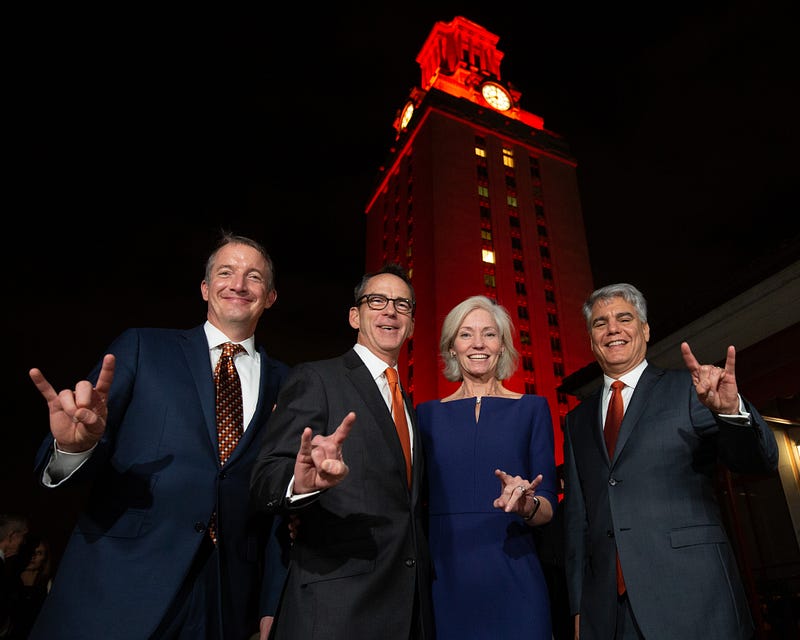
Once the Canfields had children, they volunteered in the classroom, chaired fundraising efforts, became board members, and endowed scholarships. They got involved with an organization in Chicago that works with middle school children in underserved communities to enhance their growth and help them get into competitive high schools. “Do you see a theme here?” Mary Beth says.
Both of the Canfields attended public schools and public universities. That experience informed their decision to focus on education — and specifically scholarships — as an area where they believed they could make an impact when they started making their first philanthropic gifts. They began supporting scholarships at her alma mater, Miami University of Ohio, as well as the Chicago Booth School and the Rush University Medical School.
“Education is the single most important investment that society makes in its members,” Phil says, “and whether it’s funded through taxes and public education, whether it’s funded privately or by philanthropy, it’s probably the best thing our country has going for it. Everybody in the world wants to come here to go to a university for a reason. It’s our most valuable resource because it just enables people to do productive things over their life.
“Our approach to being philanthropic is to have a strategy,” he continued, “and to focus and concentrate our investments where they can have a pretty significant impact. We both believe if you’re helping education and helping people get access to education, then that is the single highest leverage and best ROI investment you can make philanthropically.”
After the visit to UT with their son, Phil and Mary Beth kept returning to the McCombs Business Honors Program in their conversations.
“I really started thinking a lot about what an amazing opportunity I had to attend that program,” Phil says.
“The BHP gave me really all the fundamentals that I needed to have a successful career in business, and for that, I am truly and eternally grateful. In many ways, you can think about this gift as just a dividend back to The University of Texas for the investment made in me 30 years ago.”
When Phil arrived at UT as a freshman in 1985, he learned about the Business Honors Program, and it really appealed to him. Back then, BHP students were admitted internally and only after their freshman year in the business school. “The idea of being in a very small cohort with the very best professors, in a small classroom setting, and the ability to work with the smartest kids and learn from them made me think, ‘Wow, I’ve got to do really well my freshman year so I can get into that program.’
“Some places are just so competitive that it’s every person for themselves. BHP did a very good job when I was there of forcing situations where people have to engage with their peers, work in collaborative groups, and learn how to see what other people bring to the table. That drives compassion and that drives understanding, and you would not believe how important that is in the investing business,” says Canfield.
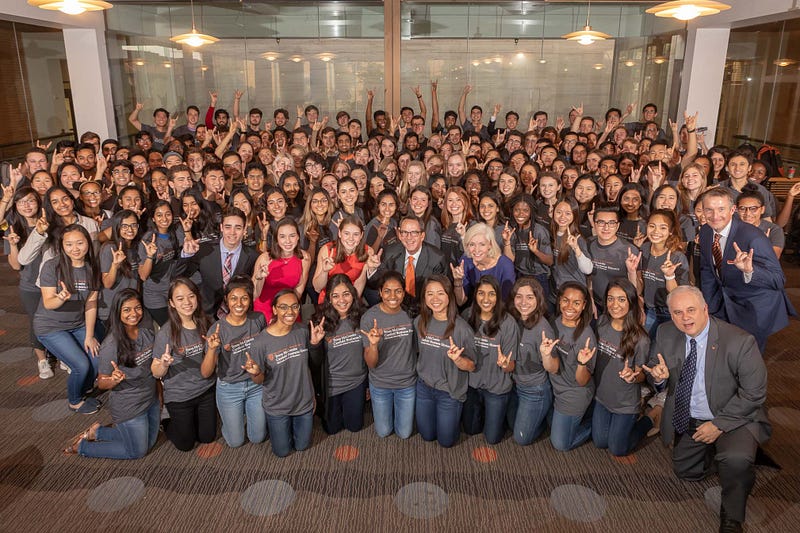
Understanding the importance of compassion — something often missing in business— ended up being a highly valuable insight that has served Canfield well throughout his career.
“People say to me, ‘What? Really? Compassion?’ My response is, ‘Absolutely,’” he says. “The reality is we’re buying private businesses, and they’re negotiated, and they’re complex. A big part of getting to a deal that makes sense is understanding the person on the other side of the table, understanding what their objectives are, and understanding that they have careers, they have families, they have children, they have golden aspirations.”
More than anything else, Canfield says it was meeting students like McCombs senior Phoebe Lin that sold him on the idea of making the gift. “I just fell in love with the program all over again. Meeting them conjured up a lot of awesome old memories.”
Lin has a full scholarship, is triple majoring in BHP, finance, and math, and has a highly competitive private equity job in New York lined up after graduation. She says that learning how to collaborate, negotiate with respect and kindness, and hold yourself to the highest ethical standards are all key principles that her BHP education has instilled in her. Without her scholarship, Lin says she would not have been able to take part in any of this rich learning. “Every BHP class does have a chunk of students who are coming from economically disadvantaged backgrounds, and the Canfield gift program’s commitment to full scholarships really moves the needle for their ability to come to UT and BHP,” she says.
After more than a year of reflecting on the program both past and present, Canfield says, “one night, I spoke to Mary Beth, and I said, I’d like to do something big with BHP. I want to do something that can really, really change the game.”
But, Canfield says, to make this kind of a gift, you have to have unwavering confidence in an institution’s leadership. “My conversations with Dean Hartzell give me faith and trust in his vision for the program and his ability to execute that within all the constraints that exist in running an organization. My confidence is very high,” Canfield says.
The Canfield name was a natural fit for the program. Shelley Nix, the program’s staff director, sees Phil Canfield as a role model for current students. “Right now the world needs leaders who are very much like Phil — leaders who are compassionate and interested in changing the world around them on the business side, but more important, changing the world in a way that’s going to affect the future for generations to come,” says Nix.
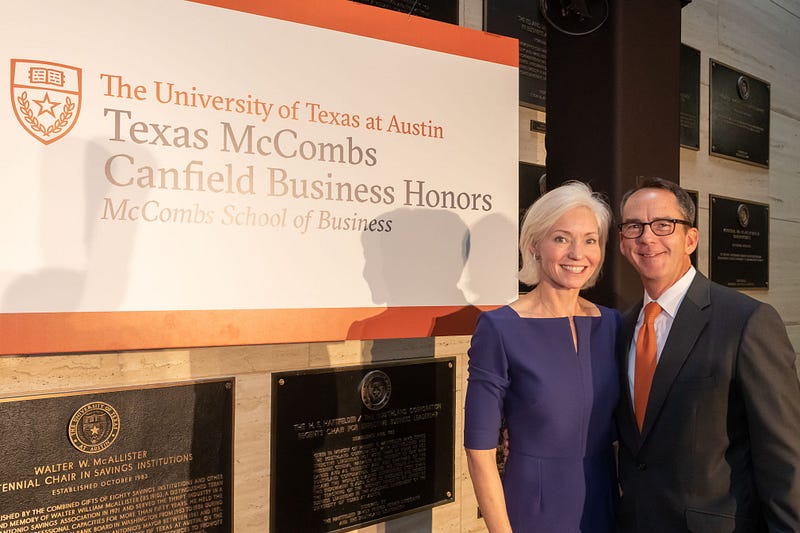
Although the gift was a natural extension of the couple’s commitment to education, it was a whole new level of giving for them. Anxiety set in when they thought about how it would change their family dynamic and their relationship with their son and two daughters. But any hesitation disappeared when they discussed the example they wanted to offer to their children. Their goal is not only to leave a lasting legacy, but for their name to uphold and exemplify their values.
“What your kids know about your wealth is a question you never know the answer to,” Phil explains. “They have some idea, but having an idea about it is very different than sitting in an audience and watching your parents get celebrated for giving millions away. That’s a whole different feeling. Having their friends find out made us concerned, but it has stimulated conversations with our kids about our wealth and about our priorities and how those two things go together. It gives you an opportunity to tell them why you did it, what you value, and how important giving back is.”
Phil and Mary Beth are proud of the ambition of the program, and they are excited about getting the word out about the culture of BHP — that its students are not only the best and the brightest, but that they’re kind, collaborative, and honest, with deep aspirations to do good in the world while making their own mark on it.
“We’re at the beginning of something that we hope can become very big and very impactful,” says Phil. “We want the Canfield Business Honors Program to be the No. 1 business program in the country, and we want it to have that reputation nationwide. Just imagine that for a moment, the best business program in the country with 100 percent scholarship coverage. What starts here really does change the world.”
As he concludes his remarks on the day of the gift announcement ceremony to warm and enthusiastic applause from the crowd, Mary Beth turns to him, barely audible, and says, “Nice job.” Indeed, well done, Canfields.
This article appeared in the spring 2019 issue of McCombs magazine. Click on the link to see the full issue.
About this Post
Share:
